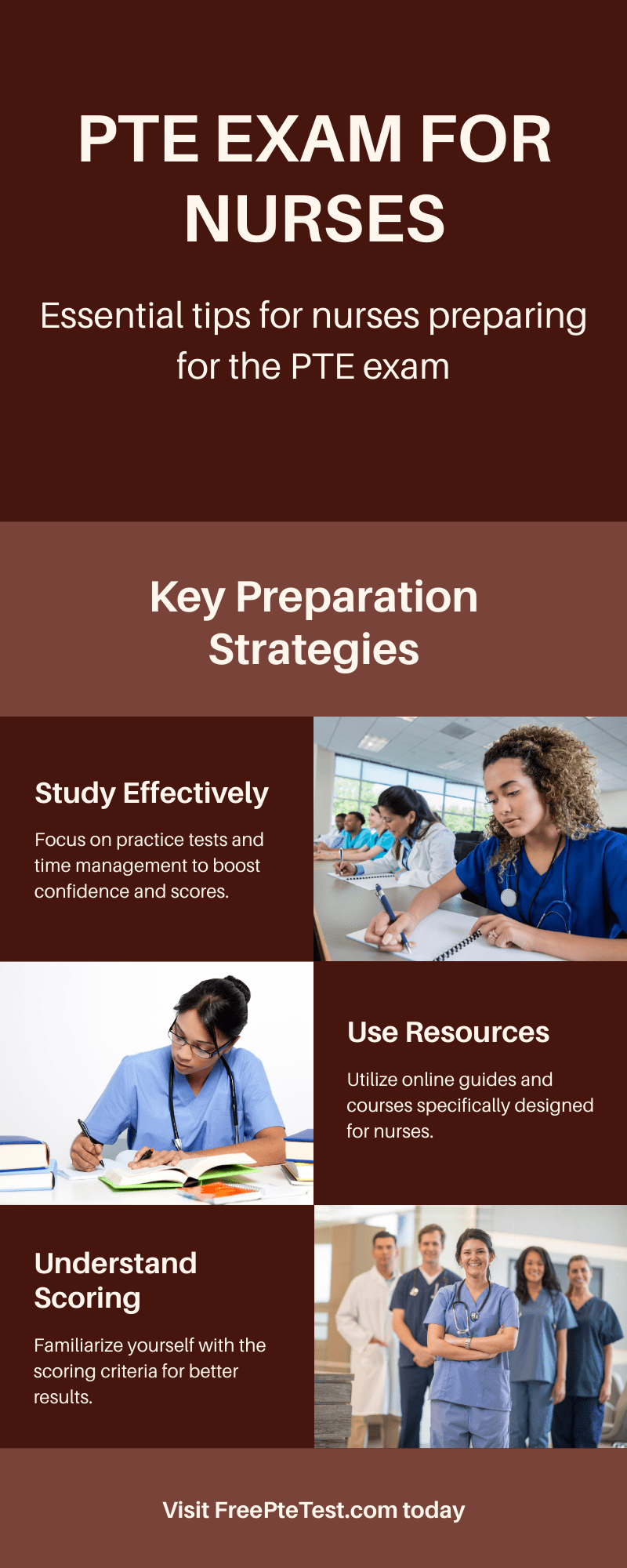Pearson Test of English (PTE) has emerged as a pivotal tool for nurses aspiring to practice in English-speaking countries. As of August 2025, with ongoing global shortages in healthcare professionals, the PTE continues to gain traction due to its efficiency, objectivity, and relevance to real-world communication in nursing settings.
This computer-based exam evaluates English proficiency across speaking, writing, reading, and listening skills, making it particularly suitable for nurses who need to demonstrate clear and effective communication in high-stakes environments like hospitals and clinics.
Unlike traditional tests that may emphasize academic jargon, PTE focuses on practical language use, such as describing patient symptoms, discussing treatment plans, or interpreting medical reports—skills essential for daily nursing duties.
For nurses trained outside English-speaking nations, proving language proficiency is often a mandatory step in registration and migration processes. The PTE stands out for its rapid results, typically available within 48 hours, allowing candidates to move forward swiftly with applications.
In 2025, updates to acceptance policies and score requirements in various countries reflect evolving needs in healthcare workforce integration. This article delves into the key features of the PTE, its structure, scoring system, country-specific requirements, benefits, and advantages for nursing professionals.
Whether you’re a recent graduate or an experienced nurse eyeing international opportunities, understanding the PTE can streamline your career path. Additionally, incorporating freeptetest resources during preparation can provide valuable practice without added costs, helping you familiarize yourself with the test format through simulated exercises.
Key Features of PTE for Nurses
The PTE Academic, the version most relevant for professional registration, is designed with features that cater specifically to the demands of nursing. First and foremost, its fully digital format eliminates the intimidation of face-to-face interviews, which can be a relief for candidates who experience test anxiety.
The test is conducted in a secure environment at authorized centers, ensuring fairness and preventing cheating. As of 2025, PTE has expanded its global network to over 450 test centers in more than 140 countries, enhancing accessibility for nurses in remote or developing regions.
One standout feature is the AI-powered scoring system, which uses advanced algorithms to evaluate responses objectively. This minimizes human bias, a common concern in subjective assessments, and provides consistent results.
Scores are reported on the Global Scale of English (GSE), ranging from 10 to 90, with detailed breakdowns for each skill area. For nurses, this granularity helps identify strengths and weaknesses— for instance, if speaking scores are low, targeted practice on pronunciation and fluency can be prioritized.
Another key aspect is the integrated skills approach. Unlike compartmentalized tests, PTE tasks often combine skills, such as listening to a lecture and then summarizing it in writing, mirroring real nursing scenarios like taking patient histories or documenting care plans.
In 2025, PTE has introduced minor enhancements to its question bank to include more healthcare-related content, such as audio clips from medical consultations or reading passages on public health issues, making it even more aligned with nursing contexts.
Flexibility in scheduling is a boon for busy professionals. Tests can be booked up to 24 hours in advance, and retakes are allowed after just five days, with no limit on attempts. This is particularly advantageous for nurses juggling shifts or family commitments.
Cost-wise, PTE remains competitive, often priced between $200 and $250 depending on location, which is generally lower than specialized occupational tests. Utilizing freeptetest options online can further reduce preparation expenses by offering mock tests and study guides without subscription fees.

Test Structure and Preparation Strategies
The PTE exam lasts about two hours and is divided into three main sections: Speaking and Writing (combined, 54-67 minutes), Reading (29-30 minutes), and Listening (30-43 minutes). Each section features a variety of question types to assess comprehensive language use.
In the Speaking and Writing section, tasks include reading aloud, repeating sentences, describing images, re-telling lectures, answering short questions, summarizing written text, and writing essays.
For nurses, describing images might involve explaining a medical diagram, while essay writing could focus on topics like patient care ethics. Preparation tip: Practice with freeptetest modules that simulate these tasks, focusing on clear articulation and coherent structure.
The Reading section comprises multiple-choice questions, re-ordering paragraphs, and fill-in-the-blanks. Passages often cover general academic or professional topics, but nurses can benefit from reading medical journals to build vocabulary.
The Listening section involves summarizing spoken text, multiple-choice questions, highlighting incorrect words, and dictation. Audio clips may include accents from various English-speaking countries, preparing nurses for diverse patient interactions.
To prepare effectively in 2025, candidates should aim for 4-8 weeks of dedicated study. Start with diagnostic freeptetest assessments to gauge baseline scores, then focus on weak areas. Resources like official PTE practice apps and freeptetest platforms offer timed simulations, helping build stamina.
Common pitfalls include rushing through speaking tasks or neglecting grammar in writing—regular feedback from freeptetest tools can address these. Many nurses achieve success by joining study groups or using AI-driven apps for pronunciation checks.
Scoring System and Interpretation
PTE’s scoring is automated and holistic, with partial credit given for partially correct answers, encouraging attempts even when unsure. The overall score is an average of the communicative skills (listening, reading, speaking, writing), while enabling skills like grammar and vocabulary contribute indirectly.
For nursing registration, minimum scores vary by country, but typically range from 65-79 overall, with no sub-score below a threshold. Results are valid for two years, and in 2025, PTE introduced digital score reports with enhanced analytics, showing percentile ranks against global test-takers.
This helps nurses benchmark their performance—for example, a score of 70 places you in the top 30% worldwide, boosting confidence in applications.
If scores fall short, analyze the breakdown: Low speaking might indicate accent issues, resolvable through freeptetest speaking drills. Retesting is straightforward, and many nurses improve by 5-10 points on subsequent attempts.
Requirements for Nursing Registration in Various Countries
Nursing registration requirements emphasize qualifications, experience, and English proficiency to ensure patient safety. As of August 2025, PTE acceptance and scores have seen updates in several jurisdictions.
Australia: The Australian Health Practitioner Regulation Agency (AHPRA) and Nursing and Midwifery Board of Australia (NMBA) oversee registration. For internationally qualified nurses, PTE is fully accepted. Recent updates effective April 2025 have adjusted scores for fairness: A minimum overall score of 66 is now required, with at least 66 in listening, reading, and speaking, and 56 in writing.
This change provides some flexibility in writing while maintaining high standards in communicative skills. Previously, it was 65 across all, but the tweak aims to accommodate diverse language backgrounds.
Alternatives include completing nursing education in English or recent practice in an English-speaking country. The process involves qualification assessment, followed by PTE submission if needed, and potential bridging programs.
United States: Requirements vary by state, managed by bodies like the National Council of State Boards of Nursing (NCSBN). PTE is accepted in many states for licensure and visa screening via CGFNS.
In 2025, a key update lowered the minimum speaking score back to 50 from 63 for visa purposes, easing barriers amid nurse shortages. Overall, aim for 55-65, with no sub-score below 50. Nurses must pass the NCLEX-RN exam and submit credentials.
States like California and New York accept PTE, but confirm with local boards. For visa screens, combining PTE with work experience accelerates approval.
United Kingdom: The Nursing and Midwifery Council (NMC) requires English proficiency but, as of 2025, does not accept PTE—only IELTS Academic or OET. Exemptions apply if trained or practiced recently in English-speaking countries.
Updates allow combining test scores from two sittings and accept employer testimonials as supporting evidence, helping over 5,000 nurses register since changes. The process includes qualification verification and a competence test if needed.
Ireland: The Nursing and Midwifery Board of Ireland (NMBI) accepts IELTS and OET primarily, with PTE gaining limited recognition in some contexts requiring min 65 in each skill. Exemptions for English-taught qualifications or three years’ practice in English-speaking nations.
A 2025 update eases pathways for experienced nurses with 1,800 hours of practice since 2017. Registration involves qualification recognition before language proof.
New Zealand: The Nursing Council of New Zealand accepts PTE for internationally qualified nurses, requiring a minimum of 65 in each component. 2025 streamlined the process to 6-9 months, including identity verification and possible Competence Assessment Programme (CAP). Exemptions for education in select countries.
Canada: Provincial regulators, via the Canadian Nurse Regulators Collaborative, now accept PTE Academic across most provinces as of 2025. Scores typically mirror others: around 65 overall. Updates include expedited pathways in Ontario and Manitoba, with tests like CELBAN also options. Registration varies but involves NNAS assessment and language proof.
These requirements underscore PTE’s growing role, though always verify with official bodies for personalized advice.
Benefits of PTE for Nurses
PTE offers multifaceted benefits in 2025’s competitive job market. Its global recognition by over 3,300 institutions facilitates migration to high-demand areas. For instance, Australia’s healthcare sector projects needing 100,000 more nurses by 2030, where PTE scores expedite visas.
Convenience is paramount: Quick booking and results mean less downtime. Cost-effectiveness, with fees often 20-30% lower than alternatives, appeals to budget-conscious nurses. The AI scoring ensures reliability, building trust in outcomes.
PTE assesses practical skills, like interpreting accents in listening tasks, directly transferable to multicultural wards. Preparation is less daunting; many nurses report needing only 100 hours of study using freeptetest aids. Career-wise, high scores open doors to advanced roles, such as nurse practitioners, and support family relocation.
Personalized learning via PTE’s online portal allows focusing on nursing-specific vocabulary, like pharmacology terms. Overall, PTE empowers nurses to overcome language barriers, enhancing job satisfaction and patient outcomes.
Main Advantages of PTE for Nursing Students
For nursing students, PTE’s advantages amplify early career prospects. Its flexible scheduling fits around clinical rotations, and computer-based nature suits tech-savvy generations. Quick results enable timely applications for internships or residencies.
Affordability is key—students can leverage freeptetest practice to minimize coaching costs. Objective scoring provides fair chances, especially for non-native speakers. Real-life assessments prepare for scenarios like emergency communications.
Wide acceptance in countries like Australia and Canada means students can plan international studies or work post-graduation. Customized prep, via FreePteTest diagnostics, targets improvements efficiently. In 2025, with hybrid learning trends, PTE’s digital format aligns seamlessly.
Ultimately, PTE not only certifies proficiency but builds confidence, making it a strategic choice for aspiring nurses.
In conclusion, the PTE exam remains a vital gateway for nurses in 2025, adapting to global needs with updated features and requirements. By embracing FreePteTest resources and staying informed on changes, nurses can navigate registration smoothly, contributing to worldwide healthcare excellence.



